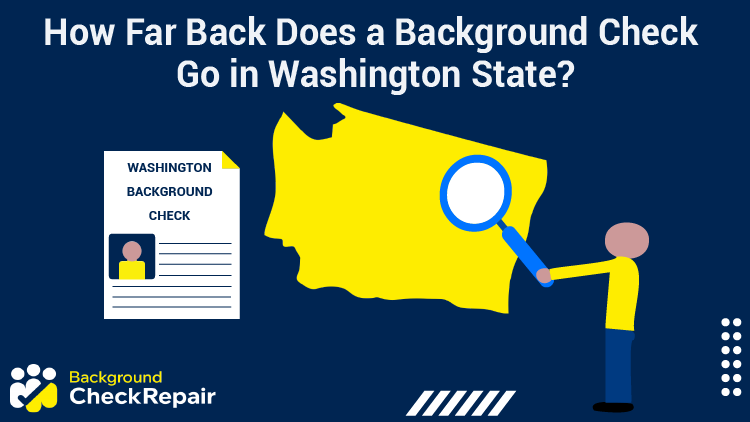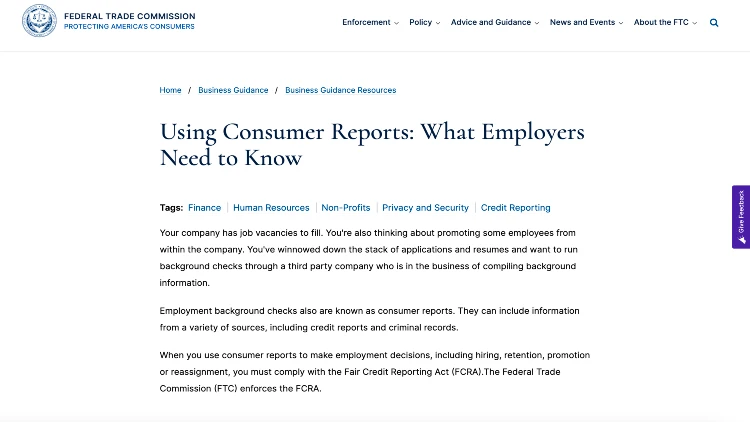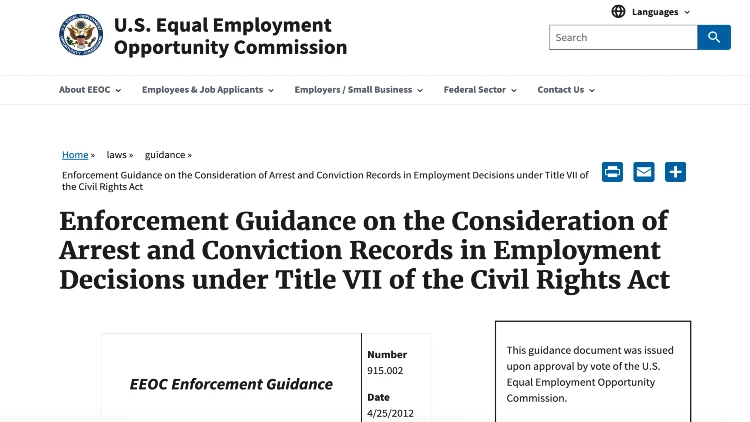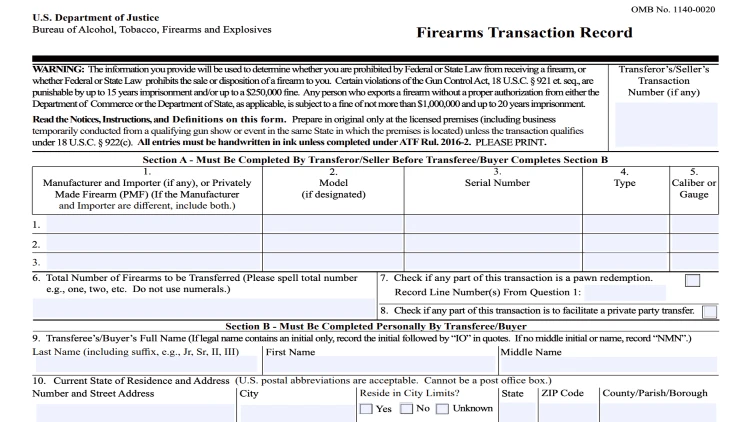How Far Back Do Background Checks Go?
Many are wondering how far into a person’s history can background checks go. Background checks go back 7 years or 10 years typically but it is always dependent on the state, type of check and information wanted.
 Written by Background Check Repair
Written by Background Check Repair
Background Checks | July 1, 2024

Table of Contents
How far back does a background check go in Washington State? According to the recent laws, checks in Washington go back seven years unless there are exemptions.
Recent laws are set by Washington State limiting the information revealed during the background check. Employers and applicants should be knowledgeable of the laws available before conducting a background check.
Washington State background checks provide essential information, including identity verification, employment history, and whether they appear in any criminal record.
Members of the public can use this information to make hiring decisions, buy and sell firearms, issue professional licenses, and get federal jobs, but how far back does a background check go in Washington State depends on the type of check being conducted and why.
Employers looking to hire in Washington State should comply with the employment background check law comprising of; federal and state laws.
| The Law | What It states |
| Fair Credit Reporting Act | When Consumer Reporting Agencies (CRAs) gather, store, and report personal information, this law protects the users’ confidentiality. Employers must provide written notice to the candidate indicating that they will do a background check. Afterward, they should get written consent from the candidate that they agree to a background check. If the employer is going to reject the application, they should follow the adverse action before hiring. |
| The 1964 Civil Rights Title VII | Title VII does not allow employment discrimination based on the racial characteristics of employees and applicants. This law is enforced by the U.S. (EEOC). The law dictates that if an employer decides not to hire an individual due to a conviction, they should separately access each trust. |
| Background Check Law | What It states |
| Statewide Ban-the-Box Law | This law forbids the employer from asking employment candidates concerning criminal records such as convictions and arrests before deciding if the candidate is qualified for the position. The employer can use criminal records after determining whether the applicant is fit for the job. |
| Seattle Fair Chance Employment Law | Seattle’s law prohibits the employer from looking at an individual’s criminal record until after the screening. |
| Use of Arrest Information | The Human Rights Commission in Washington states that arrests that do not result in a conviction should not be used by employers during the hiring process. |
| Restrictions in Credit Reports for Employment | According to RCW 19.182.020, it limits the employer from requesting credit scores from employees unless; The need for a credit score is in the job requirements, the employer will have to request a report. The credit report is provided for under state and federal law. |
| Law Concerning Social Media | RCW 49.44.200, prohibits hiring managers from requesting applicants’ social media information. Employers should not request applicants to add them to their contact list, open social media in their presence, or change privacy settings to access their social media pages. |
Washington has statewide and local laws governing background checks, which mirror the FCRA and other 2023 laws.1

(Image: Federal Trade Commission7)
Various employment background checks go back seven years.
Therefore, a Credit Reporting agency should look into criminal and court records seven years from the date of the report.
However, if a position reaches a certain salary threshold, involves working with vulnerable groups, handles large amounts of money, or is a government job, then it can look back further depending on the details being searched.
According to FCRA law in Washington State, background checks can go back for seven years if the applicant’s compensation is less than $20,000. For applicants whose salary is more than $ 20,000, the 7-year rule does not apply.
The Human Rights Commission of Washington State considers the use of arrest records as a discriminating employment practice. However, charges that are still pending may warrant a review.
The Department of Social and Health Services (DSHS) offers emergency services to pregnant mothers, the aged, children, and other vulnerable people.
This department has a Background Check Central Unit (BCCU) with its own database that conducts many background checks annually, including fingerprint checks for people working in DSHS. How far back does a background check go in DSHS? It is reported 7 years or could go back indefinitely.6
How to do a DSHS background check through the BCCU:
Help tools to complete the form are found in the BSC Online authorization Guide.
Please email or save it because it is not accessible after closing the webpage.
Information sources searched by BCCU when conducting a background screening
Depending on the kind of background search, BCCU reports information from the following;
BCC Priority Request
BCC has provided a way to expedite the process for background checks, but it must meet one of the following criteria;
Send an email titled “Priority request” and add this information to request expedited background check processing:
Criminal background checks are thorough and depend on the information requested. Criminal convictions can be reported indefinitely on background checks for jobs and salary levels.
How far back does a background check go in Washington State? Reporting of convictions is limited to seven years unless the applicant’s expected income exceeds $20,000.2
A criminal background check also exposes the type of charges found on the applicant, except for juvenile records and other court-sealed records.
Yes, Criminal checks are accessible to anyone in Washington. According to the Freedom of Information Act (FOIA) in 2023 Law, criminal records are public records since law enforcement agencies created them.

(Image: U.S. Equal Employment Opportunity Commission8)
Exemptions are those sealed, expunged or restricted by law. Information provided in the criminal record includes:
Criminal records, considered public in the United States, are also made available through third-party sites. Typically requesters must provide the following information to gain access:
A fingerprint background check is frequently regarded as the primary standard for screening criminal histories in employee background checks.
The FBI’s Integrated Automated Fingerprint Identification System (IAFIS) is used to run the most common type of fingerprint check.
Technically a fingerprint check can go back as far as a person’s record allows. The review retrieves information associated with the applicant’s fingerprint, whether it is personal details (name, address, family members, etc.) or criminal history data.
A federal criminal background check uncovers criminal records unavailable at a county or state level. In some cases, the search might go in-depth and search for fingerprints in the FBI database, check the residential address, interview spouses, and examine social media profiles.
How far back does a background checks go in Washington state?
A federal check for employment in Washington State reveals a lifetime of criminal history for convictions and pending cases prosecuted in a national court system.
This type of check refers to a national and state review based on fingerprints. It also considers disqualifying offenses by law for holding positions of trust or financial responsibility.
This check looks into criminal histories involving offenses antagonizing minors, the elderly, people with disabilities, and some helpless people.
Such an in-depth and intensive screening method can reveal court-sealed records, including juvenile convictions. Volunteers and personnel at retirement homes, childcare centers, and educational establishments are constantly subjected to a level 2 records check.
They may also be required of those wishing to become foster parents or adopt children.
How far into your past can a level 2 check dig up in Washington State? It can go ten years or more, depending on the information searched.
Washington State joined other jurisdictions by passing the ban-the-box laws according to RCW 49.94.010, the Fair Chance Act, on June 7, 2018.
This law forbids the employer from asking employment candidates about convictions and arrests before determining if the candidate qualifies for the position.
The Act has various limitations on employers;
The Act has exemptions; it does not apply to;
About 100 cities and 18 states have placed restrictions on employers when inquiring about a candidate’s criminal history. Regulations include the timing and content of such questions according to the Act.
The 18 states are:
These statutes prevent applicants from being pre-judged or eliminated because of their criminal record.3 This law exempts positions of public safety and places where extensive criminal history checks are required by law.
However, employers don’t like to follow this rule because it may be frustrating to go through the hiring process only to let go of the applicant because of a bad criminal record.
Washington State follows federal law in the process of Acquiring Firearms. Washington allows an individual to carry firearms without a permit and a concealed carry permit for carrying a loaded gun in a car.
Anyone buying firearms from Federal Firearms Licensee (FFL) has to fill out a Firearms Transaction Record form. The individual selling the gun will then run the details through various databases.

(Image: U.S. Department of Justice9)
The next question now is regarding the timeline of a background screening for a firearm. It takes a few seconds to get the results from the databases.
The FBI/NCIS are majorly done for long gun purchases but sometimes for lowers and receivers. They check the following databases;
If any of the databases reveals that an individual is forbidden from accessing a firearm, then the application is denied. If the information requires further research to determine whether the application is prohibited, the request will be delayed.
However, if the application is rejected, one can appeal to the FBI/NCIS. In Washington State, a gun background check goes back 7 years or indefinitely and takes a few minutes to get your results.
Conducting a background check on an applicant is a critical step in the hiring process, and you might wonder how long is a background check completed. It depends on many factors.
Depending on the type of information sought or verified, employment background checks can yield a wealth of data.
Background checks components and length of time:
| Type of Check | Length of time |
| Identity verification | This search is instant, reviewed, and made available before placing an order. |
| National Criminal Database Search | The search is completed instantly. It checks profound records in millions of millions of databases. |
| Federal Criminal Records Search | On average, it takes less than an hour, and on occasional searches, it takes a few days. Federal criminal records are usually stored in federal courts, including 194 districts across the United States. |
| National Sex Offender Registry | On average, it takes up to 2 hours to complete, a few are instant. It depends on the name being searched and is mainly done manually to validate the accuracy. |
| Global Terrorist Watch list | With good technology and hands-on research, it takes a few seconds. |
| County-Level Criminal Search | On average, it takes a few minutes, while others take a few days to complete. Again on rare occasions where the counties are remote and open for a few days, the search may take longer than expected. |
| Statewide Criminal Records Search | It takes about two weeks to search all criminal records in Washington State. |
| Motor Vehicle Records | Most reports are available in online databases; therefore can avail the information within the same day. |
| Educational Background Verification | Education turnaround times can range from minutes to days, depending on how schools respond and their records. |
| Employment Verification | It takes one or two business days to verify, depending on the number of previous work histories and how fast they respond. It can also be minutes. |
| Drug Screens | The average time to receive lab-based drug screening is around two to three days. If it is a negative result, it is available to the applicant after 2 days. If it is positive, it will be repeated and may take days |
| Credit Reports | Credit information is returned immediately |
| Clinical Services | The turnaround period is 48 hours and 72 hours after placing the order |
The overall background check can take weeks to complete if you send a request to various agencies, multiple former employers, and educational institutions.4
A 7 years felony rule is a reporting restriction in some states when an employer is doing a background check. This rule applies when the applicant is expected to earn a salary of $20,000 or less.
A 7-year rule can report only convictions.
State law has placed many restrictions on employers and how they do background checks on applicants. In conclusion, how far back does a background check go in Washington State, 7 years or, in some cases, it may be a lifetime record of any convictions or criminal history.5
Many are wondering how far into a person’s history can background checks go. Background checks go back 7 years or 10 years typically but it is always dependent on the state, type of check and information wanted.
No, official background checks are not free and are processed through Washington State Police through the Washington Access to Criminal History. Additionally, it costs $12 for a name-based background check.
Yes. Unlike the physical application, the quick and easy way to submit your request is online or by mail.
The background check authorization form is available here to be filled with thorough information and instructions. The document is later sealed and transported.
According to the 2023 law, employers can only go back for seven years unless exemptions exist. Employers are not allowed to know some criminal records which may alter.
Pre-employment checks involve verification of identity and goes back as far as seven years. However, some may go back further depending on the type of such but a red flag will definitely show within that time frame.
Criminal background checks are thorough and it goes back seven years or so determined by the type of information they are searching for and the salary levels.
According to FCRA law in Washington State, background checks can go back for seven years if the applicant’s compensation is less than $20,000. For applicants whose salary is more than $ 20,000, the 7-year rule does not apply.
Employment verification is as simple as calling the references on the resume to confirm employment. It also involves doing a level 1 check.
Technically a fingerprint check can go back as far as a person’s record allows. In a background screening in Washington State, it goes 7 years.
For those wondering how far back a criminal history check go, most criminal background checks will go back seven years though some states allow 10-year background checks.
The Washington background check for employment involves examining a person’s records to ensure they are a right fit for the job.
A criminal background screening in Washington involves looking through a person’s criminal history.
1Washington State Department of Social and Health Services. (2022). Background Check Central Unit. Washington State Department of Social and Health Services. Retrieved November 03, 2022, from <https://www.dshs.wa.gov/ffa/background-check-central-unit>
2Rodgers, M. J. (2022, September 26). Washington State Background Checks for Employment [2022]. iprospectcheck. Retrieved November 03, 2022, from <https://iprospectcheck.com/background-check-washington-state/>
3Rodgers, M. J. (2022, October 13). How Long Does a Background Check Take to Complete? [2022]. iprospectcheck. Retrieved November 03, 2022, from <https://iprospectcheck.com/how-long-does-a-background-check-take-to-come-back/>
4Korolevich, S. (2022, October 5). How Far Back Do Background Checks Go? GoodHire. Retrieved November 03, 2022, from <https://www.goodhire.com/resources/articles/how-far-back-do-background-checks-go/>
5Klazema, M. (2022, October 04). How Far Back Does a Background Check Go? (2022 update). BackgroundChecks.com. Retrieved November 04, 2022, from <https://www.backgroundchecks.com/blog/how-far-back-does-a-background-check-go/>
6Rodgers, M. J. (2020, September 23). What is Employment Verification? Everything You Need to Know [2022]. iprospectcheck. Retrieved November 04, 2022, from <https://iprospectcheck.com/employment-verification/>
7Federal Trade Commission. (2016 Oct). Using Consumer Reports: What Employers Need to Know. Federal Trade Commission. Retrieved Jul 1, 2024, from <https://www.ftc.gov/business-guidance/resources/using-consumer-reports-what-employers-need-know>
8U.S. Equal Employment Opportunity Commission. (2012 April 25). Enforcement Guidance on the Consideration of Arrest and Conviction Records in Employment Decisions under Title VII of the Civil Rights Act. U.S. Equal Employment Opportunity Commission. Retrieved Jul 1, 2024, from <https://www.eeoc.gov/laws/guidance/enforcement-guidance-consideration-arrest-and-conviction-records-employment-decisions>
9Bureau of Alcohol, Tobacco, Firearms and Explosives. Firearms Transaction Record. U.S. Department of Justice. Retrieved Jul 1, 2024, from <https://www.atf.gov/firearms/docs/4473-part-1-firearms-transaction-record-over-counter-atf-form-53009/download>
We use cookies to ensure that we give you the best experience on our website. If you continue to use this site we will assume that you are happy with it